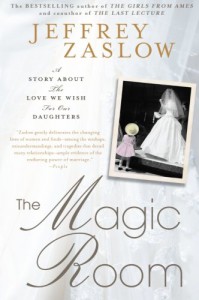A Reading Vocation
"I Must Read, Read, and Read. It is my Vocation." - Thomas Merton
This is where I chronicle my reading life. I also blog about writing at Lacey's Late-night Editing.
Book 2/100: The Magic Room by Jeffrey Zaslow

There's a blurb from the Washington Post on my copy of this book that says,"
You want heart, you go to Jeff Zaslow . . . . Books like Zaslow's reflect our hopes for the world we want to live in."
Perhaps that's why something about this book fell short for me -- although it was non-fiction, it did feel like a somewhat rose-colored version of the world that we live in -- not so much for the stories it contained but for the way they were presented, as if all hardship ultimately led to a happy-ever-after, or at least the possibility for one.
"The Magic Room" follows the stories of several women who pass through Becker's Bridal, an independent bridal shop in Michigan, as well as the women who own and work in the shop. I found the stories of the individual brides more compelling than the history of the shop and the descriptions of women trying on dresses. I liked shopping for my wedding dress, and this book brought back a few sweet memories (I even teared up in a few places), but I'm just not there when it comes to infusing the dress an the search for it with some kind of ultimate meaning.
Zaslow seemed to focus on the most tragic brides he could find (one who got unexpectedly pregnant young but still found love just before she delivered; another who was in a car accident and lost most of her right hand before her wedding; one whose mother had died suddenly when the daughter was only 14; etc.) He drapes this stories in optimism, and there's almost a "Prince Charming" quality to the fact that these women found "true love" despite various kinds of heartache. But part of why the stories might not have resonated with me is that they take place so early in the marriage journey. Yes, they all "found" someone, but that's only the beginning. I find myself more interested in how marriages evolve over time and weather hardship after they've already committed to each other. There was also an underlying sense of awe in some of the stories, as if it were unbelievable that women in difficult circumstances could have found the right guy -- at one point, a father ruminates over whether his daughter who lost most of her fingers on one hand in a car accident would have ever "found someone" if she hadn't been engaged before it happened. Seriously? A few missing fingers makes a woman doomed to a life alone? That's some serious cynicism under this book's white lacy facade.
The book seemed to veer slightly toward the conservative side, giving a lot of attention to a family of girls who had decided not to kiss anyone before they were engaged or married. I was also disappointed that there was not a single lesbian bride featured, or any implication that people who didn't fit into the heterosexual ideal would find love or get married at all.
Still, perhaps I'm just being harsh because the book didn't find me at the right time. Would I have been more swept up by its stories if I were still engaged myself, or if I had a daughter who was engaged? I guess now there's no way to know.



